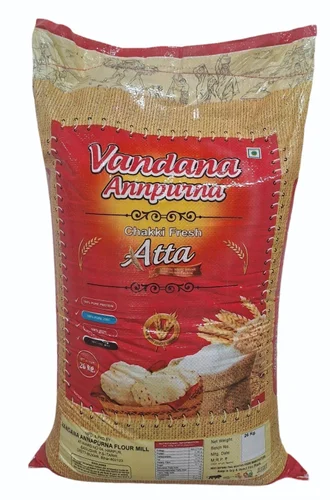26kg Vandana Annpurna Chakki Atta
₹715.0
| Brand | Vandana Annpurna |
| Packaging Type | Bag |
| Best Before | 2 Months |
| Usage/Application | Cooking |
| Type | Chapati Flour |
| Speciality | High in Protein |
| Pack Size | 26kg |
| FSSAI No. | 10422040000162 |
- 100% Pure protein
- 100% Pure zinc
- 100% Iron
- Natural Whole Wheat Hygienically Packed
- 100% Vit b12
- The taste makers
Whole Grain Goodness
- Endosperm Contains carbohydrates, and proteins Helps to increase strength and Build muscles
- Choker Contains Fibre Minerals And vitamin help to improve metabolism
Fresh Corn Grinded
Fresh grams grinded
Whole Grains are slowly grinded
Absorb More Water
Non sticky dough that remaind frsh for long soft tasty and nutritious rotis
You must be logged in to post a review.
Q & A
Organic products are generally considered more sustainable than conventional products due to their production methods and environmental impact. Here are several factors that contribute to the sustainability of organic products:
Reduced chemical inputs: Organic farming practices prioritize the use of natural fertilizers and pest control methods, minimizing the reliance on synthetic chemicals. This reduces the potential negative impacts on ecosystems, soil quality, and water resources.
Soil health: Organic farming focuses on building and maintaining healthy soil through practices such as crop rotation, composting, and the use of organic matter. Healthy soil promotes biodiversity, improves water retention, and reduces erosion, contributing to long-term sustainability.
Biodiversity preservation: Organic farming methods support biodiversity by avoiding the use of synthetic pesticides and genetically modified organisms (GMOs). These practices create a healthier ecosystem, including beneficial insects, birds, and wildlife, which play crucial roles in maintaining a balanced environment.
Water conservation: Organic agriculture generally uses less water compared to conventional methods. By prioritizing soil health and water retention, organic farming practices can reduce water runoff, improve water quality, and minimize the strain on local water resources.
Reduced energy consumption: Organic farming tends to rely on traditional and low-energy methods, such as hand weeding and mechanical weed control, instead of relying heavily on fossil fuel-based machinery. This can result in reduced energy consumption and lower greenhouse gas emissions.
Support for rural communities: Organic farming often involves smaller-scale and local agricultural practices, which can contribute to the economic viability of rural communities. By supporting local and sustainable agriculture, organic products help create jobs and foster community resilience.
While organic products generally have positive sustainability attributes, it's important to note that not all organic products are created equal. The specific practices and standards can vary among certification bodies and regions. It's advisable to look for recognized organic certifications, such as USDA Organic or EU Organic, to ensure the products meet certain established standards.
Furthermore, the transportation and packaging of organic products can still have an environmental impact. Buying local or regional organic products can help reduce the carbon footprint associated with transportation.
Overall, organic products are considered a more sustainable choice compared to conventional alternatives, but it's crucial to consider the entire life cycle and make informed decisions to further enhance sustainability.
General Inquiries
There are no inquiries yet.





Reviews
There are no reviews yet.